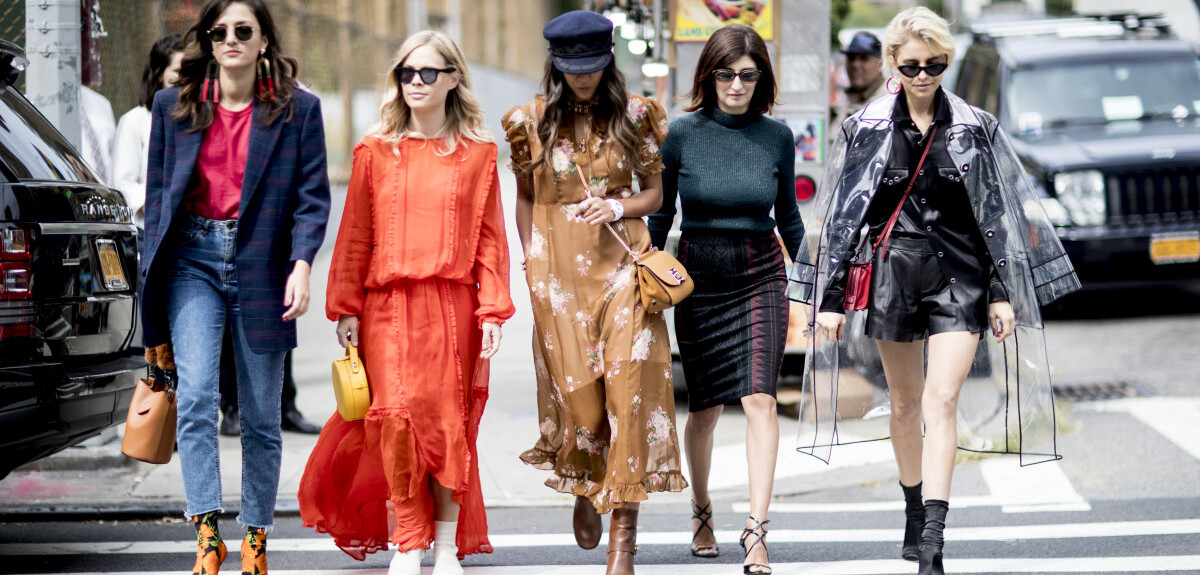over 6 years ago

When you think of fashion, what do you think?
Do you think about runways? Outrageous outfits? Creativity? Skinny models? Celebrities? Or maybe a waste of money?
Whatever your impression of fashion, it is evident that fashion plays a vital role in today's society.
You've probably heard of the saying "You only get one chance to make a good, first impression". Believe it or not, this is why style has its importance.
Our brain is a fantastic machine; it puts things in a box which makes it easier to know what to expect and how to react.
Let's put that affirmation in context:
If I don't know you, the second I meet you, I will try to gather information about who you are. By this I mean, unfortunately, judging and categorising you.
As it is a rapid process, the judgement will be done based on your appearance.
Fashion: A societal role
In ancient times, fashion represented a social organisation. Leaders could wear the most majestic garments made with fine materials that defined this group, while the lower classes wore simple outfits. The point was to make easier to know who you were dealing with. Friendly tribes or generational enemies, a specific colour would have been enough to make up your mind. Political leader, rich or poor, the clue always has been in the outfit.
More than a societal role, fashion is now personal.
What is the importance of fashion for social life and what role does it play in society? The question is are you a victim of fashion?
Nowadays, style comes in all shapes, trends and sizes. We all can wear from expensive and sophisticated garments to the most modern or classic clothes.
Like a theatre character has its own costume, makeup and accessories to create a personality we have a full wardrobe.
Some people dress in high-end, fashionable clothing to show that they take care of themselves and want to stand out positively. Others may wear clothes that allow them to hide - plain jeans and tops that enable someone to blend into a crowd.
Some will spend the little money they have on expensive bags, shoes or coats to feel they are part of a social class able to afford those pieces of fashion - Social class is still recognisable through fashion.
We all think rich people get better treatment, so, it makes sense to try to look like them to benefit their favours.
Fashion promises no utility, just a positive behaviour when others look at you.
It is human nature to aspire for distinction. We want to stand up from the crowd. We all want to climb the social ladder, at least, that's what we are taught. No reasons to be surprised when we witness people trying to emulate the most respected and elegant people. Yes, your respect can be measured by your wealthy, healthy wardrobe.
For some, brand names carry intrinsic value and wearing branded items gives someone self-esteem and pride in their appearance. This makes a massive difference on a daily basis, as we all can feel by instinct the difference between a strong and confident person and someones who is not.
Fashion generally radiates from the higher class people, the so-called prestige owning people. They set in motion a new style which is later picked up by others. This enhances the influence of the upper classes and those imitating them.
On the other side of the coin, some people do not care about fashion, and while this is fine, it does not necessarily serve the person well. People are often judged by their lack of fashion sense. Even though people may not judge others by lousy fashion sense on the surface, the issue does come up in the matters of job promotion and future success.
Fashion: A giant for the worldwide economy
In a recent interview, Stephanie Phair, the new chairman of the British Fashion Council, said it is time to give the fashion industry the credit it deserves.
“There’s a perception that needs to change,” she said, “It’s a visible industry and one that should be championed.”
We must admit fashion is going through a challenging time at the moment:
1. Burberry was criticised for burning millions of pounds worth of unwanted products, a practice since ended.
2. Academic Dr Giulia Mensitieris, author of 'The Most Beautiful Job in the World', offers a very damning view of the way the fashion industry is run. Her book exposes the darker side of the French fashion industry, looks particularly at the working conditions of young creatives, who, for example, are paid in vouchers or clothes rather than receiving a proper salary.
Even with all those critics, the fashion industry is still a pillar of the economy.
The fashion industry added £32bn to the economy last year, according to the British Council — as much as telecoms and more than car makers.
It employs 900,000 people (as many as financial services) and is growing faster than the broader economy.
More important, despite a terrible reputation, the fashion industry is actually working on making the world better.
Some big companies use their money and their fame in the service of a cause. For example, Kering, the retail company that owns luxury fashion brands including Gucci, Saint Laurent, Alexander McQueen and Stella McCartney is combating violence against women through its Kering Foundation since 2009. The foundation focuses on funding global projects, partnering with NGOs, charities, educating the public and its own employees on problems of sexual and domestic violence and harmful practices such as Female Genital Mutilation.
In a nutshell, fashion plays a crucial role in society and not only allows us to define our style and help us differentiate ourselves from others.
Fashion is also what we love to hate. It clearly helps us to express and define our personality, visually communicate our interests and tastes but stays criticised for it.
And yet, fashion is still one of the most important and profitable industries in the world.

